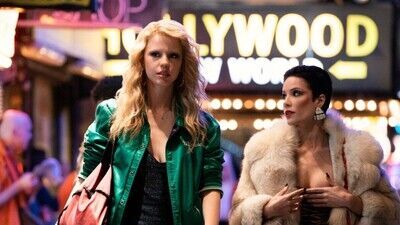The Night Stalker is on the loose, terrorizing innocent citizens who fear they’ll be his next victim. And conservatives are complaining that movies and music are going to turn America’s youth into Satanists. (Among the montage of period-specific news footage off the top is Twisted Sister lead singer Dee Snider testifying before the Senate about censorship.)
Within this volatile mix is Goth’s Maxine Minx, whom we last saw fleeing the adult film set of “X” in 1979. Now it’s 1985, and she’s made her way to Hollywood, fueled by dreams of stardom and an unshakable sense of self. Porn shoots and peep shows have sufficed for a while, but she knows she’s destined for something greater. An opening sequence in which she auditions for a legitimate picture -– the horror sequel “The Puritan II” — suggests she may be right. Working once again with cinematographer Eliot Rockett, West shoots Maxine in a long, single take as she struts onto a soundstage in skin-tight denim, silhouetted against the haze of the San Fernando Valley sun.
As we learned from the first film in this trilogy, she has that X factor – and that’s precisely what makes “MaXXXine” so frustrating as it evolves. The core of the story is that various young women in Maxine’s orbit are being lured to their gory deaths. We know she’s not the killer, but a couple of LAPD detectives (Michelle Monaghan and Bobby Cannavale) are after her anyway to see if she can help them. So is a New Orleans private investigator hired by a sinister force from her past (Kevin Bacon in smoked aviators, doing a Foghorn Leghorn accent).
Oddly, this combination of pressures turns Maxine into a reactive figure, which is not her (or Goth’s) strong suit. The very thing that made the character so captivating, both within this setting and the make-believe of movie acting, is her swagger, and the sense that she might do anything at any moment in the name of fame. “MaXXXine” strips her of that spark and renders her a passenger.
This is especially clear in her many scenes with a commanding Elizabeth Debicki as the director of “The Puritan II,” who drives Maxine around the Warner Bros. lot in a golf cart, delivering soliloquies about art and her desire to make “a B-movie with A ideas.” Perhaps that’s what West is after, as well. But if he’s addressing the handwringing over pop culture as a destructive force, he’s not doing so in a particularly novel or insightful way.

